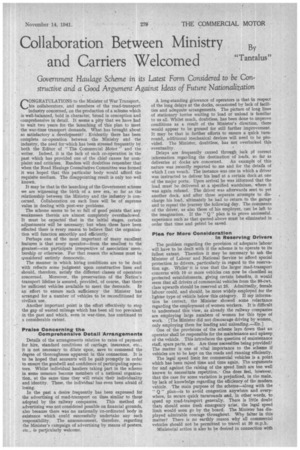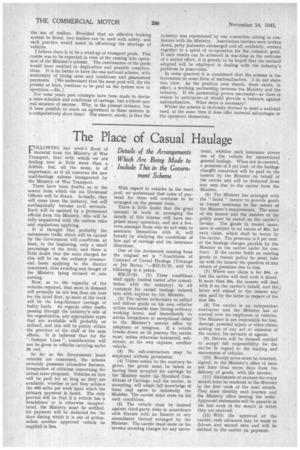Collaboration Between Ministry By and Carriers Welcomed "Tantalus"
Page 33

Page 34

If you've noticed an error in this article please click here to report it so we can fix it.
Government Haulage Scheme in its Latest Form Considered to be Constructive and a Good Argument Against Ideas of Future Nationalization
fThONGRATULATIONS to the Minister of War Transport, his collaborators, and members of the road-transport industry concerned, on the production of a scheme which is well-balanced, bold in character, broad in conception and comprehensive in detail. It seems a pity that we have had to wait two years for the launching of this plan to meet the war-time transport demands. What has brought about so satisfactory a development? Evidently there has been complete co-operation between the Ministry and the industry, the need for which has been stressed frequently by both the Editor of " The Commercial Motor" and the writer. Indeed, it is the lack of such co-operation in the past which has provided one of the chief causes for complaint and criticism. Readers will doubtless remember that when the Road Haulage Consultative Committee was formed it was hoped that this particular body would afford the requisite medium. The disappointing result is only too well known.
It may be that in the launching of the Government scheme we are witnessing the birth of a new era, so far as the relationship between the Ministry and the industry is concerned. Collaboration on such lines will be of supreme value in dealing with post-war problems.
The scheme seems to he so full of good points that any weaknesses therein are almost completely overshadowed. It must be expected that in the initial stages, certain adjustments will be necessary; but when these have been effected there is every reason to believe that the organization will function smoothly and efficiently.
Perhaps one of the most important of many excellent features is that every operator—from the smallest to the greatest—can participate irrespective of associationmembership or otherwise. For that reason the scheme must be considered entirely democratic.
The manner in which hiring conditions are to be dealt with reflects some judgment upon constructive lines and should, therefore, satisfy the different classes of operators concerned. Moreover, the preservation of the Nation's transport lifeline is assured, provided, of course, that there be sufficient vehicles available to meet the demands. Iv an effort to ensure such sufficiency the Minister has arranged for a number of vehicles to be reconditioned for civilian use.
Another important point is the effort effectively to stop the gap of wasted mileage which has been all too prevalent in the past and which, even in war-time, has continued to a considerable extent.
Praise Concerning the Comprehensive Detail 'Arrangements Details of the arrangements relative to rates of payment for hire, standard conditions of carriage, insurance, etc., it is not necessary to dilate upon, save to commend the degree of thoroughness apparent in this connection. It is to be hoped that accounts will be paid. promptly in order to ensure the goodwill and confidence of participating operators. Whilst individual hauliers taking Part in the scheme in some measure become members of a national organization, at the same time they will retain their individuality and identity. These, the individual has even been afraid of losing.
In the past a desire frequently has been expressed for the advertising of road-transport on lines similar to those adopted by the railway companies. This method of advertising was not considered possible on financial grounds, also because there was no nationally 'co-ordinated body in existence which could successfully undertake any such responsibility. The announcement, therefore, regarding the Minister's campaign of advertising by means of posters, etc., is particularly welcome. A long-standing grievance of operators is that in respect of the long delays at the docks, occasioned by lack of facilities and adequate arrangements. The picture of long lines of stationary lorries waiting to load or unload is familiar to us all. Whilst much, doubtless, has been done to improve conditions as a result of the Minister's direction, there would appear to be ground for still further improvement. It may be that in further efforts to ensure a quick turnround, additional mechanical devices will need to be provided. The Minister, doubtless, has not overlooked this eventuality.
Delays are frequently caused through. lack of correct information regarding the destination of loads, so far as
deliveries at docks are concerned. An example of this nature was recently reported to me and for the details of which I can vouch. The instance was one in which a driver was instructed to deliver his load at a certain dock at one of the major ports. Upon arrival he was informed that the load must he delivered at a specified warehouse, where it was again refused. The driver was afterwards sent to yet another dock, and after three separate attempts to discharge his load, ultimately he had to return to the garage and to repeat the journey the following day. The comments of the driver, as also those of his employer, can be left to the imagination. If the " Q " plan is to prove successful, experience such as that quoted above must be eliminated in order that time and petrol be saved.
Plea for More Consideration in Reserving Drivers
The problem regarding the provision of adequate labour will have to be dealt with if the scheme is to operate to its 'fullest extent. Therefore it may be necessary to ask the Minister of Labour and National Service to afford special protection to drivers, particularly in regard to the reservation age. Whilst' it is true that the larger road-transport concerns with 10 or more vehicles can now be classified as protected establishments, giving certain benefits, it would seem that all drivers of commercial vehicles from the 30-cwt. class upwards should be reserved at 25. Admittedly, female labour could, and should, be more widely employed for the lighter type of vehicle below this category. If my information be correct, the Minister showed some reluctance regarding the employment of women workers. It is difficult to understand this view, as already the railway companies are employing large numbers of women for this type of work, [The Minister did not discourage driving by women, only employing them for loading and unloading.—En.]
One of the provisions of the scheme lays down that an operator shall be responsible for the maintenance and upkeep, of the vehicle. This introduces the question of maintenance staff, spare parts, etc. Are these necessities being provided? The matter is one of vital importance to the scheme if vehicles are to be kept on the roads and running efficiently.
The legal speed limit for commercial vehicles is a point which has been raised time and time again. The arguments for and against the raising of the speed limit are too well known to necessitate repetition. One does feel, however, that the case for some variation is prejudiced, in the main by lack of knowledge regarding the efficiency of the modern vehicle. The main purpose of the scheme—along with the " Q" plan—is to avoid congestion anywhere and everywhere, to secure quick turnrounds and, in other words, to speed up road-transport generally. There is little doubt that should some fresh emergency arise, the legal speed limit would soon go by the board. The Minister has displayed admirable courage throughout. Why falter in this matter? There is no earthly reason why all commercial vehicles should not be permitted to travel at 30 m.p.h.
Ministerial action is also to be desired in connection with the use of trailers, Provided that an effective braking system be fitted, two trailers can be used with safety, and such practice would assist in off-setting the shortage of vehicles.
I believe there is to be a wind-up of transport pools. This course was to be expected in view of the coming into operation of the Minister's scheme. The continuance of the pools would have resulted in duplication and possible complications. It is far better to have the one national scheme, with uniformity of hiring rates and conditions and guaranteed payments. [We understand thafthe meat pool will, for the present at least, continue to be paid on the system now in operation.—En.] For some years past attempts have been made to devise a rates schedule and conditions of carriage, but without any real measure of success. Why, in the present instance, has it been possible to reach an agreement in these matters in a comparatively short time? The answer, surely, is that the industry was represented by one committee sitting in conference with the Ministry. Association barriers were broken down, petty jealousies submerged and all, evidently, worked together in a spirit of co-operation for the common good. If such results can be achieved in war-time as the outcome of a united effort, it is greatly to he hoped that the method adopted will be ernployed in dealing with the industry's problems in peace-time.
In some quarters it is considered that the scheme is the forerunner of some form of nationalization. I do not share this view. As the position now stands, there exists, in effect, a working partnership between the Ministry and the industry. If the partnership proves successful—as there is reason to anticipate—it should Provide a bulwark against nationalization. What more is necessary?.
Whilst the scheme is obviously devised to meet a natienal need, at the same time it does, offer material advantages to the operators themselves.
























































